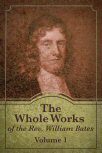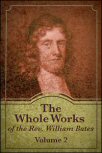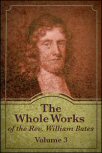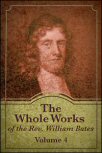The Whole Works of the Rev. William Bates (4 vols.)
Digital Logos Edition
Overview
Educated at the University of Cambridge as well as its constituent, Emmanuel College, Reverend William Bates was a distinguished and popular 17th century preacher. Logos is proud to offer The Whole Works of the Rev. William Bates (4 Vols.) from this important contemporary of such Puritan stalwarts as Richard Baxter and John Howe.
William Bates' work was published in 1700—the year after his death—by Aylmer and Robinson. The title for that initial collection was The Works of the Late Reverend and Learned William Bates D.D. and it included two previously unpublished works, On Divine Meditation and On the Fear of God. A second edition of the work was published in 1723 with an addition of Bates' The Everlasting Rest of the Saints in Heaven. All of Bates' works were arranged and revised in 1815.
With the Logos Bible Software edition, each volume in The Whole Works of the Rev. William Bates (4 Vols.) collection is fully integrated with the other resources in your digital library, including Bibles, maps, dictionaries, and numerous other Bible study tools. All Scripture references are linked directly to the text of the Bible, making your Bible study, and teaching preparations more effective and rewarding. You can also explore Scripture on a deeper level with search features, Passage Guides, and the other interactive features in your digital library. That makes these important doctrinal books more useful than ever for pastors, teachers, Bible study leaders and anyone who wants to get deeper into the truth of God’s Word.

- A collection of doctrinal meditations and treatises
- Sermons preached by William Bates, including sermons preached on the Day of Ejection 1662
- Various funeral sermons with sermons preached on the death of Queen Mary and the funeral sermon for Richard Baxter
- All Scripture references are linked to the Bibles in your library
- Title: The Whole Works of the Rev. William Bates
- Author: William Bates
- Publisher: Robinson, Son and Holdsworth
- Volumes: 4
- Pages: 2,136

- The Editor's Preface
- Considerations of the Existence of God
- The Immortality of the Soul
- The Divinity of the Christian Religion Proved
- The Harmony of the Divine Attributes
- A Brief Memoir of the Rev. W. Bates, D.D.
- Dr. Bates' Speech to the King

- Sermons on the Forgiveness of Sins
- The Sure Trial of Uprightness
- The Great Duty of Resignation
- The Danger of Prosperity
- Spiritual Perfection Unfolded and Enforced

- The Everlasting Rest of the Saints in Heaven
- On Divine Meditation
- On the Fear of God
- The Last Four Things
- Spiritual Perfection Unfolded and Enforced
William Bates was born in 1625 in London. He studied at Emmanuel College, Cambridge, and in 1644 and went on to study at Queen's College. A Presbyterian minister, Bates was vicar of St. Dunstan's-in-the-West until the passing of the Act of Uniformity 1662 when Bates—along with 2,000 clergymen—left the established Church in what became known as the Great Ejection.
Bates took part in the negotiations for the restoration of Charles II, eventually being appointed one of the royal chaplains. Refusing the urgings to accept the deanery of Lichfield and Coventry, Bates took the oath imposed by the parliament 'that he would not at any time endeavor an alteration in the government of church or state.'
In 1668 Bates worked with more moderate churchmen to try and incorporate the Presbyterians back into the Church of England but no agreement could be reached. After many more unsuccessful attempts at reconciliation, James II ascended to the throne and the persecution of the Nonconformists increased.
In the last years of his life, Bates pastored the Presbyterian church of Hackney. He died there in 1699, at the age of seventy-four. Dubbed the silver-tongued preacher, Bates was considered the politest of the Nonconformists.
Reviews
2 ratings

Debra W Bouey
2/25/2016

Larry Proffitt (I
11/19/2013
